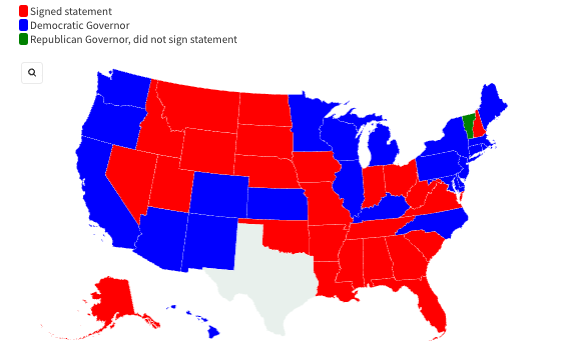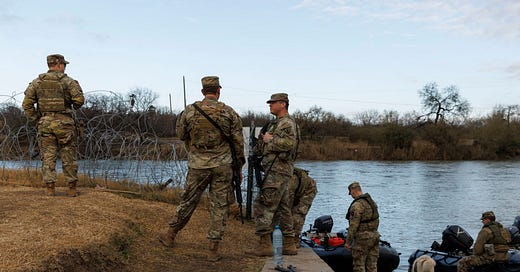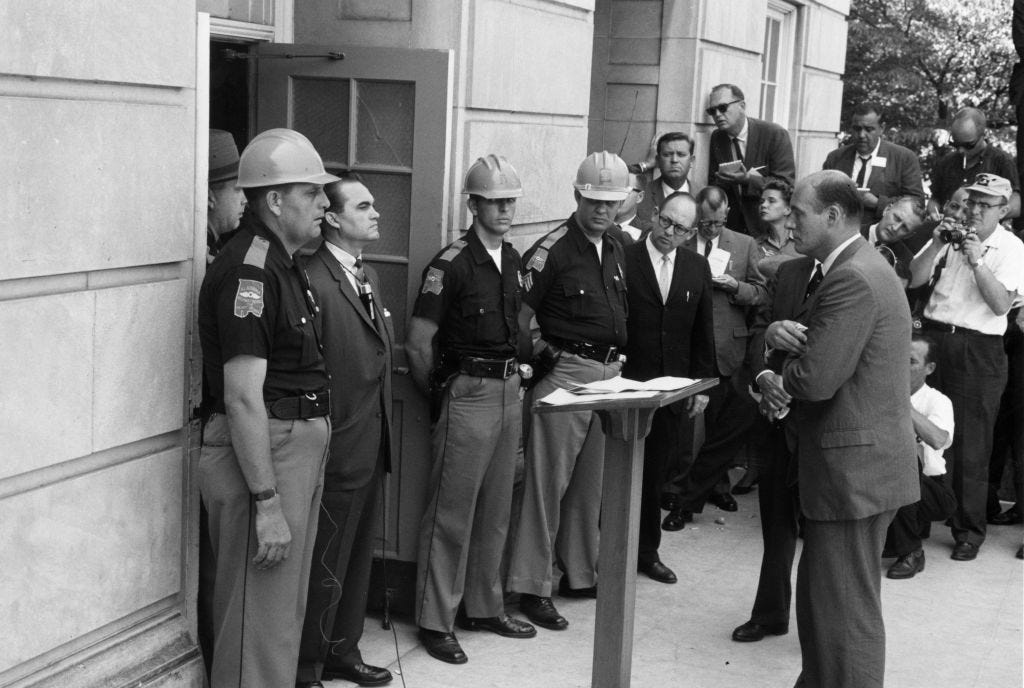Election Countdown, 282 Days to Go: The “States’ Rights” Era Returns.
In 2000, the Supreme Court told Florida to stop counting votes. Florida obeyed. In 2024, the Court tells Texas to stop disobeying US Border Patrol policies at the border. Texas says, Make us.
Armed troops on the US side of the Rio Grande at Eagle Pass, Texas, two days ago. These forces belong not to the US military but rather to the Texas National Guard. Governor Greg Abbott has ordered them to obey his instructions, not those of the US Border Patrol or the US Supreme Court. (Photo Michael Gonzalez/Getty Images)
This post is videos and quotes from what could turn out to be a highly consequential week. I’ll start with the one that seems potentially most important, though it’s a crowded field. Four others follow.
1) ‘If the Supreme Court gets something wrong…’
This past Monday, the US Supreme Court ruled that the US federal government had jurisdiction over US national borders. And specifically that if Texas National Guard and other Texas forces kept installing razor wire along the Rio Grande, on orders from Governor Greg Abbott, they could not prevent US Border Patrol officers from removing it.
The Supreme Court ruling came with no explanation and was only by a 5-4 margin. It’s a sign of our times that this was even a close call, given longstanding Court rulings that the national government controls national borders. Americans hold passports from the United States, not from Iowa or California. When an international flight lands at Newark airport, inbound passengers deal with federal agents, not New Jersey state police. (For more detail and history, see the note below.1)
The politics of immigration and “the mess at the border” are long-brewing and increasingly nasty. But the Texas reaction is significant. The Supreme Court said: Here is what you will do. Texas said: We won’t.
That’s oversimplified but not by much. Even more important is what happened next. Apart from Greg Abbott in Texas, there are 26 other Republican governors. All but one of them signed a letter three days ago, supporting the Texas assertion of “Constitutional Right to Self-Defense.” The exception was Phil Scott, Republican governor of Vermont. USA Today made an explanatory map of GOP solidarity. The red states below are where Republican governors are supporting Abbott. (Blue are Democratic; green, appropriately, is Vermont.)

In a piece in Slate, Mark Joseph Stern clearly explained what was so radical about the GOP position in modern terms—and how familiar it was in the long context of “state’s rights.” The title of Stern’s piece distills the argument: “GOP Governors Invoke the Confederate Theory of Secession to Justify Border Violations.” It is worth reading that piece—and then watching an excellent interview Jake Tapper of CNN conducted two days ago with one of these governors, Kevin Stitt of Oklahoma.
The essence of the current GOP case is that the federal government has broken the “compact” states agreed to 237 years ago when writing the Constitution. Thus if states don’t now feel that the feds are doing their job, they can take over some federal duties, like controlling the border, themselves.
I encourage you to watch the Tapper/Stitt interview, at this link. Here is a sample of how it goes (with emphasis added):
Gov. Stitt: … We're trying to enforce the law in Texas, which I've been to the border myself. I've sent troops down there in support of Governor Abbott… Everybody knows we cannot allow people into the country illegally…
Jake Tapper: Let's just say for the sake of argument that I agree with everything you said. What Governor Abbott is doing and what you and the other governors who have written this letter are supporting is defying the US Supreme Court.
I wonder if you have any concern that this opens the door for let's say Democratic governors to defy US Supreme Court decisions with which they disagree. Say, on gun rights because they think it's in the interest of public safety even if the Supreme Court says what they want to do is is unconstitutional? [JF note: just the right question from Tapper.]
Stitt: Well, we all agree that the Constitution is the supreme law of the land. And if the Supreme Court gets something wrong, for example, if they tried to ban and say that we didn't have a second amendment right to bear arms, I think the Constitution supersedes somebody in Washington DC telling us…
The states have a right to defend themselves, the states created the federal government, the federal government did not create the states.
Of course what Stitt is saying touches some of the oldest arguments in American history. In 1803 we had Marbury v. Madison. In the 1830s, we had John C. Calhoun and his “nullification doctrine.” In the 1940s, Strom Thurmond founded his “States’ Rights Democratic Party,” aka the Dixiecrats2, to resist federal desegregation mandates. In the late 1950s and early 1960s, governors like Orval Faubus in Arkansas and George C. Wallace in Alabama declared their states’ rights to ignore Supreme Court rulings and federal law.
In June, 1963, the governor of Alabama, George C. Wallace, stood with state troops blocking an entrance at the University of Alabama, to defy a federal desegregation order. At right is Nicholas Katzenbach, then Deputy Attorney General, representing the United States. The episode is captured in Robert Drew’s pioneering behind-the-scenes documentary Crisis. (Getty Images.)
Like every argument in American life, we’ve heard it all before. But I don’t recall the state-sovereignty claim being made quite so openly since the days of Faubus and Wallace. And this time it’s not just the South.





